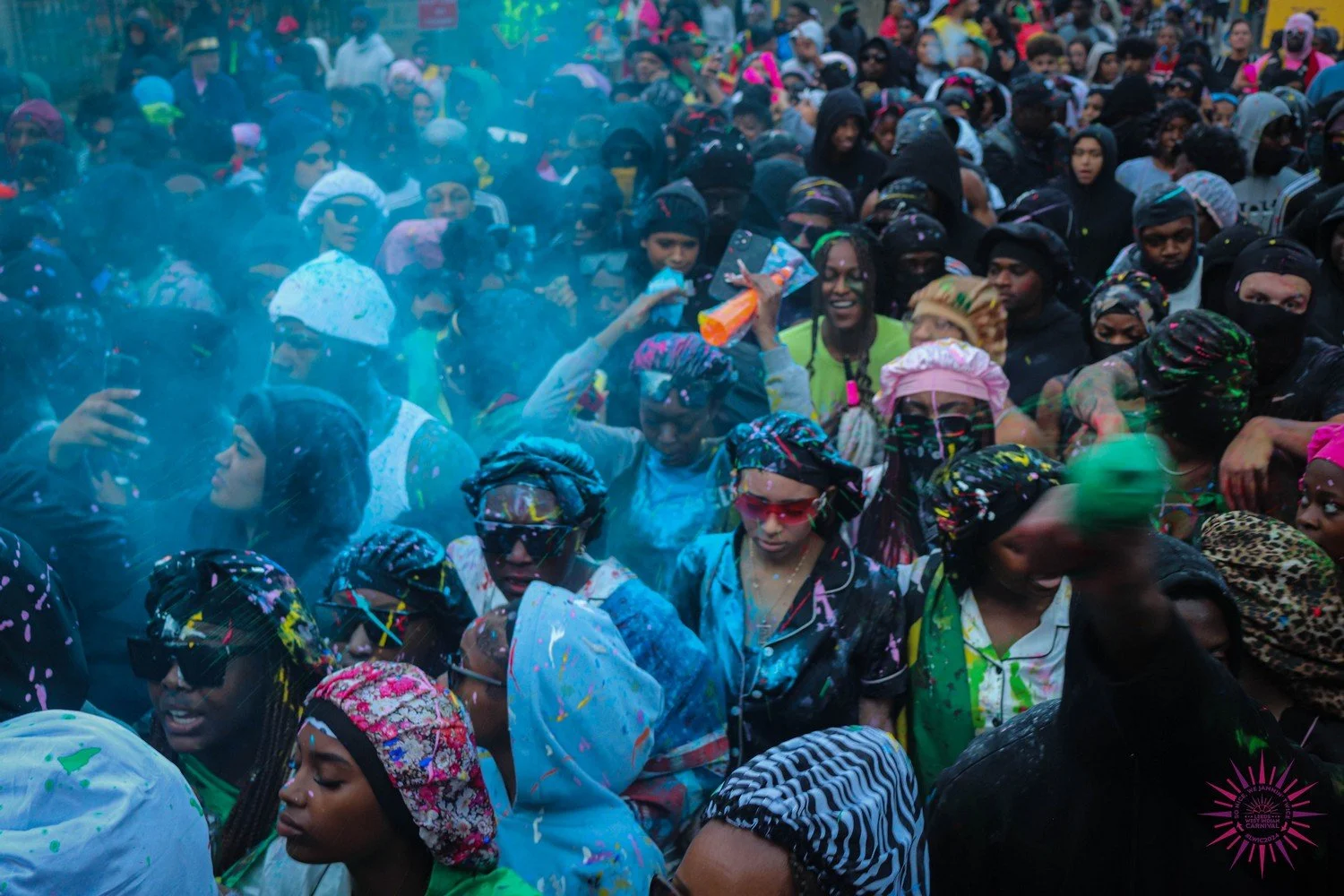THE COMPLEX COST OF Carnival
RE-IMAGINING carnival FUNDING IN THE UK
5 min read
Leeds West Indian Carnival 2024. A masquerader from the band AnonyMas Carnival.
JMO Photography 2024.
It’s June and summer is already well on the way with outdoor activities becoming more alive. In the Global North, temperatures are rising and heat waves are passing, getting us excited for the next couple of weeks ahead. Caribbean communities, institutions and organisations here have also carved out this month to celebrate their identity and heritage. In the United States, its Caribbean-American heritage month, whilst in the United Kingdom, June 22nd is earmarked as Windrush Day - celebrating when people from the Commonwealth Caribbean began arriving en masse to help rebuild the “mother country” after WWII. As such, these Caribbean communities, inclusive of Canada, have been celebrating their cultural identity for decades during the summer in the best way they know how: Carnivals.
Since the end of May with Memorial Day weekend in the US, carnivals in Atlanta and Orlando have already wrapped up, with longstanding mega events like Toronto’s Caribbean Carnival (formerly Caribana) and the New York West Indian Day Parade to come. For the UK, carnivals in cities and towns like Luton and Preston have ended, with Derby, Manchester and Nottingham, just to name a few, upcoming in a matter of days and weeks. Closing off the season on the August Bank Holiday weekend are the Notting Hill Carnival and Leeds Carnival happening simultaneously, giving you a choice of carnival culture either in Northern or Southern England. Back in the Caribbean, our radars are set to countries like St Lucia, Antigua, Barbados and Grenada who all have distinct carnival offerings in the summer months. And while preparations are ongoing as we look forward to roaming the streets, dancing, liming and listening to steelpan and soca music, the dominant music that fuels these festivals, originating from Trinidad and Tobago, a concern lurks in the background, especially in the UK, about the sustainability of our carnivals: its funding mechanisms, ongoing budget limitations, and the uninformed public perception about how carnivals are put on.
I’ve had the awesome opportunity to have been serving on the Board of Trustees of the Leeds West Indian Carnival for the past 2 years. Starting in 1967, it’s a long standing Caribbean carnival in the UK with over 100,000 attendees - a massive carnival - second in the UK only to Notting Hill’s mammoth of a carnival with an estimated over 1 million attendees. This experience of voluntarily serving as a trustee has exposed me to an entirely different model of carnival management against the prior experience I gained back home in Trinidad and Jamaica, working for both public and private sector carnival organisations. What several may not realise and understand with carnivals in the UK, is that the majority of your local carnival organisations are registered charities. They’re rarely for profit companies, or may also be registered as social enterprises, in the name of public good and benefit. Whilst such a country like Trinidad and Tobago has a state owned carnival agency that also largely supports carnival events for the public good, this charity led model is a far cry from the dominant commercial interests that are paired alongside cultural products for carnival organisations in the Caribbean. Both approaches for producing carnivals are needed, but the deep rooted social, racial and postcolonial context that UK-based carnivals have had to function in, leaves much to be desired when its funding is heavily dependent on the said local government councils and grants from external sources.
Leeds West Indian Carnival 2024.
JMO Photography 2024.
Carnivals the world over are seen as huge income generating activities. From Brazil to Trinidad, London to New Orleans, reports post carnival often focus heavily around earnings, spending, visitor arrivals and hotel occupancy to demonstrate its success . Just last year, a commissioned report by The Voice UK stated that Notting Hill Carnival generates £396 million in the London economy. These types of important and necessary information usually leaves readers with the impression that everyone involved in carnival is earning big money. While there definitely will always be top earners, whether it’s the food vendors, those who charge the public to use their household toilets along the parade route, to the hired trucks for the music sound systems, and soca artistes coming from places like Trinidad who perform on them, we unfortunately see that the very said charitable carnival organisations which have responsibility for a number of oversight of the event’s management, may actually not have the earning mechanisms in place to keep them comfortably sustained as they would like or need to. It’s this limited income generation feature that needs urgent attention moving forward.
As registered charities, and this is not limited to the carnivals, but across the arts, culture and heritage sector in the UK, so much of it is dependent on grant funding, local government support and sponsorship where possible, for it to happen. In most cases for carnivals, the majority of support comes from your local government town or city council, who, depending on the agreed responsibilities, might actually be the real event managers, with the local carnival organisation being the public face of it. You see, the magnitude and scale of carnivals with its many moving parts has to be done as a collaborative effort between various stakeholders, which makes its execution complex. State actors like local governments and police have oversight of key management areas such as permits for food and beverage, road closures, security and counterterrorism, with all these coming in at a not so cheap cost. Councils already have responsibilities for general living realities under its jurisdiction, so when there is a tightening of the national and local belt, arts and culture, though important for community building and economic development, is first on the chopping block and last to be reinstated, as we’ve seen with the covid pandemic. More so, the history of government policies, or lack thereof, alongside issues with policing of Black and other migrant communities in the UK, has left decades of intergenerational distrust between government/councils and communities. The Windrush Scandal of 2018 is still fresh for many, making institutional racism very real. Added to that, the current unwelcoming tones around immigration only continues to reaffirm that distrust. Whilst not approving of the social ills like crime that might still be present within some of our communities, the media reports and sensationalism around carnival in the UK can often feel that it’s only one culprit at fault and to blame.
Carnival organisations are therefore heavily at the mercy of government support for their carnivals to be executed, with at least two local Caribbean carnivals I know of having their entire plug pulled in 2024. The leaked concerns recently publicised of much needed additional funding for Notting Hill Carnival’s security and crowd management brought the conversation back to limelight. The effects of reduced budgets might manifest itself in shortened and changed parade routes, less trucks on the road and the non-staging of key events. Producing carnivals in the style, fashion and standard we’ve grown accustomed to and see in the Caribbean is difficult to sustain only by passion and love, both of which cannot be used to pay carnival’s bills. It needs large sustainable financial support when functioning in the capitalistic nations, inclusive of the Caribbean, that we live in. Even when it comes to lucrative grant funding schemes that may be multiyear when awarded, these are competitive, come with check box exercises to be completed, and are time bound. It’s important not just for carnival organisers to begin rethinking their funding approaches, but also staying true to the idea of carnival as a celebration rooted in African emancipation and keeping it accessible to its own people; but economic leakage is happening and the respective communities too may also need to put their money, time and talent alongside any complaints. In Trinidad and Tobago for instance, whilst there is heavy government support and subsidies for several carnival activities, there are equally a lot of entrepreneurial ventures taking place to execute events, fetes, costume designs and mas bands. Teaching and empowering the community on the business side of carnival is essential for us to better negotiate what we need, and produce events, costumes and music to a quality and standard to be enjoyed by all.
J’ouvert morning through the streets of Chapeltown, Leeds
Tes McFly Photography 2024.
One area of priority therefore has to be community engagement and education to bring about this change, as it’s usually only a handful of people leading carnival arts and management, whilst the public assumes the funding acquisition and distribution. With continued council distrust around the upkeep of Caribbean cultural heritage, the Caribbean community needs to demonstrate that we truly value the said thing that we are worried about. We must understand, appreciate and respect the labour and time for designers and mas makers, who are also investing in their creative careers, in hopes to be better equipped with the resources to produce work that is truly representative of us. We must uphold and support our artistes, steelpan players and deejays with their performances and events, just as we may do for international artistes who put on large concert productions. If our local carnival organisations through consultations devise mechanisms for example, small ticketing fees or put out calls for volunteers, we ought not to keep leaving it to the other person to respond or put their hands in their pockets
As we celebrate Windrush Day and get ready for summertime Caribbean carnivals, may we aim to have greater autonomy in producing our events and festivals, contributing to its lifelong legacy whilst mindful of changing demographics, generational views on our identity and adapting in a way that keeps us at the centre of our narrative. May we be the ones who fuel the business activity that supports both the carnival and the community and inspires others to turn their carnival love into liveable income.
Written by
Kearn Christopher
The Karnival Czar



